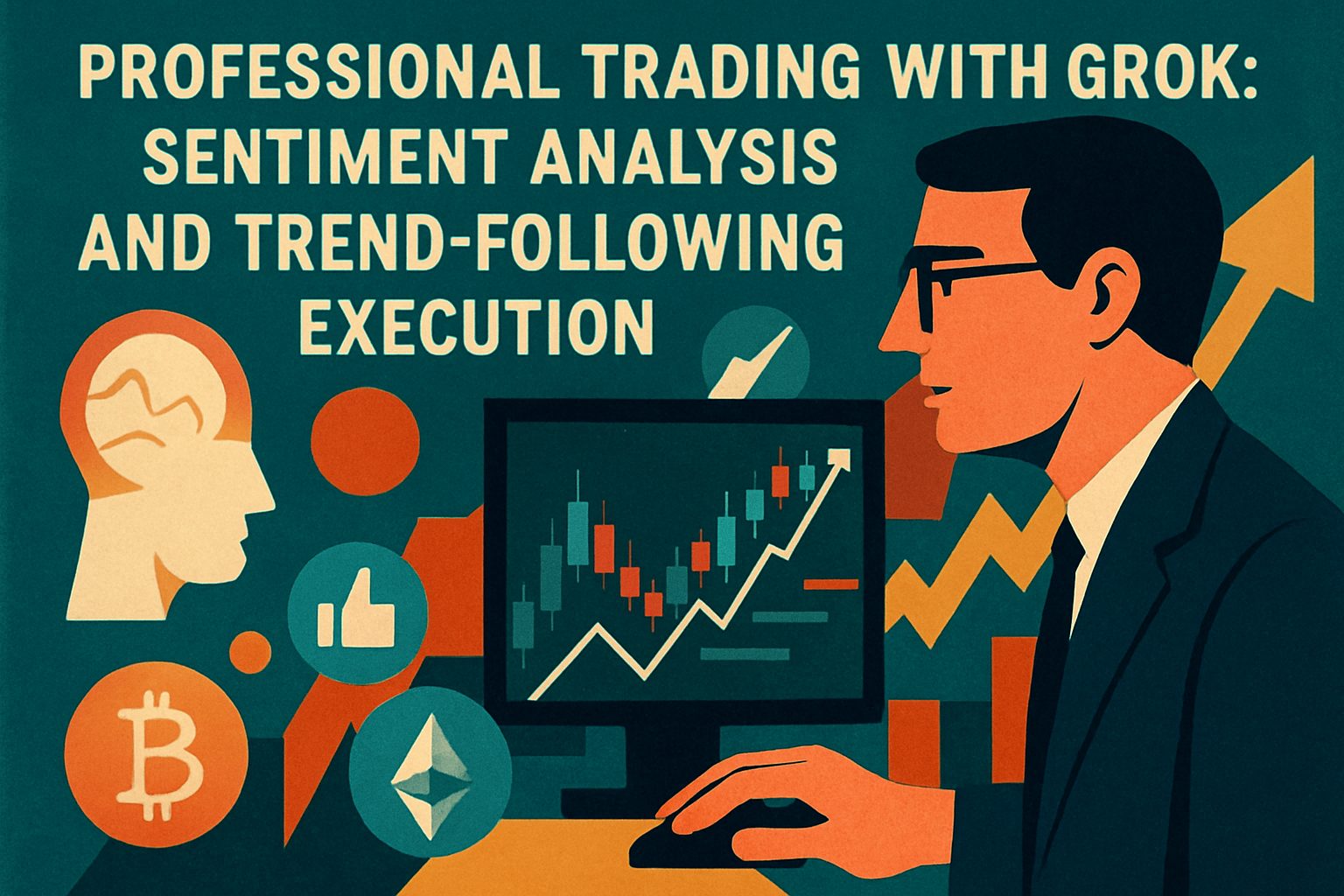
How Pro Traders Use Grok AI to Spot Crypto Trends & Execute Profitable Trades
Discover how professional traders are combining Grok’s real-time sentiment analysis with systematic trend-following strategies to identify emerging crypto assets and capture early momentum. This hybrid approach merges social intelligence with technical discipline for potentially superior risk-adjusted returns in volatile markets.

Thesis Statement
Professional traders are increasingly leveraging Grok’s real-time sentiment analysis capabilities to identify emerging crypto assets and market opportunities, then applying systematic trend-following strategies for execution—creating a hybrid approach that combines social intelligence with technical discipline for potentially superior risk-adjusted returns.
Evidence & Factual Foundation
Grok’s Sentiment Analysis Capabilities
Grok scans real-time sentiment on X (formerly Twitter) to detect early crypto trends, including meme coin momentum and macro reactions. The system goes beyond simple keyword counting to perform deep contextual analysis, using natural language processing to:
- Decode emotional tone and intent in each post
- Track sentiment shifts across thousands of conversations simultaneously
- Identify emerging narratives before they reach mainstream awareness
Professional traders have documented several specific applications:
“In April 2024, mentions of TURBO increased across X, driven by developer discussions and previews of upcoming features. This shift preceded a 22% price rally roughly 36 hours later, suggesting sentiment tools can expose momentum ahead of chart-based signals.” – Cointelegraph Analysis
Three Primary Use Cases for Professional Traders
- Early Detection of Lesser-Known Tokens
- Tracking sentiment in emerging assets before significant price action
- Identifying developer activity and community building patterns
-
Capturing early momentum in micro-cap opportunities
-
Meme Coin Momentum Tracking
- Monitoring social engagement spikes around specific tokens
- Measuring viral potential through share/retweet velocity
-
Macro Event Reaction Analysis
- Detecting market responses to economic data releases
- Tracking regulatory discussion sentiment shifts
- Connecting macroeconomic events to specific asset reactions
For example, during December 2024 CPI reports, Grok detected positive sentiment spikes around inflation data that preceded measurable market movements.
Critical Analysis: Weighing Different Approaches
Sentiment Analysis vs. Traditional Technical Analysis
| Approach | Strengths | Limitations | Best For |
|---|---|---|---|
| Grok Sentiment | Early signal detection, narrative tracking | False positives, noise filtering | Momentum identification |
| Technical Analysis | Objective entry/exit points, backtestable | Lagging indicators, pattern failures | Execution timing |
| Fundamental Analysis | Long-term value assessment | Slow-moving, subjective | Portfolio construction |
Integration Challenges and Solutions
Professional traders face several integration challenges:
- Signal Verification: Social sentiment can be noisy and misleading
- Solution: Use multiple confirmation sources and timeframes
- Execution Timing: Sentiment peaks don’t always align with optimal entries
- Solution: Combine with technical breakout confirmation
- False Positive Filtering: Not all social buzz translates to price action
- Solution: Develop quality metrics for signal strength assessment
Logical Reasoning: The Hybrid Approach Framework
Why Sentiment + Trend Following Works
The combination addresses critical weaknesses in each approach individually:
- Sentiment analysis provides early warning but lacks precise timing
- Trend following provides disciplined execution but often enters late
- Together they create a complete alpha-generation system
Risk Management Considerations
Professional implementations typically include:
# Example risk framework for sentiment-driven trend following
position_size = min(
account_risk_per_trade, # Typically 1-2% of portfolio
sentiment_strength * volatility_adjustment,
trend_confirmation_score * maximum_allocation
)
This ensures that even strong sentiment signals don’t override sound risk management principles.
Performance Visualization


